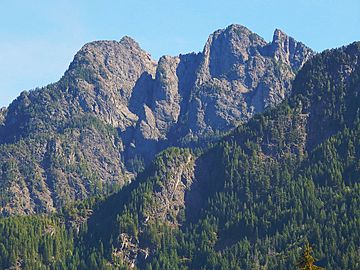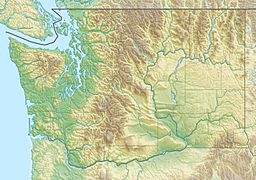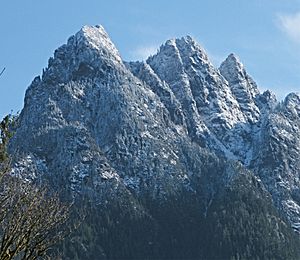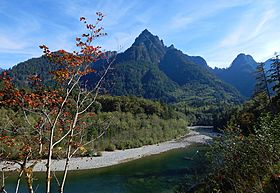Russian Butte facts for kids
Quick facts for kids Russian Butte |
|
|---|---|

Russian Butte
|
|
| Highest point | |
| Elevation | 5,123 ft (1,561 m) |
| Prominence | 523 ft (159 m) |
| Geography | |
| Location | King County, Washington state, U.S. |
| Parent range | Cascade Range |
| Topo map | USGS Bandera |
| Climbing | |
| First ascent | 1960 by USGS Survey Party |
| Easiest route | Scrambling |
Russian Butte is a cool mountain with two peaks, located in King County, Washington state. It sits on the western edge of the Cascade Range, inside the Mount Baker-Snoqualmie National Forest. Even though it's not the tallest mountain around, it stands out because it rises steeply from the land around it.
The closest taller mountain is Preacher Mountain, about 3.29 miles (5.3 km) to the east. A smaller peak called Little Comrade is also nearby, about 0.5 miles (0.8 km) to the south-southwest. All the rain and snow that falls on Russian Butte eventually flows into the Snoqualmie River.
Weather at Russian Butte
Russian Butte is in a special climate zone called the marine west coast climate. This means it gets a lot of moisture from the Pacific Ocean. Most of the weather systems start over the Pacific and move northeast towards the Cascade Mountains.
When these weather systems hit the tall Cascade Mountains, they are forced to rise. As they go higher, the air cools down and drops its moisture as rain or snow onto the mountains. This process is called Orographic lift. Because of this, the western side of the Cascades gets a lot of rain and snow, especially in winter.
During winter, it's often cloudy. But in summer, high-pressure systems over the Pacific Ocean usually bring clear skies. The snow on Russian Butte can be very wet and heavy, which can make avalanches more likely. The best time to visit or climb Russian Butte is usually from July to September, when the weather is nicest.
How Russian Butte Formed
The Cascade Range where Russian Butte is located started forming millions of years ago, during a time called the late Eocene Epoch. Later, during the Pleistocene period (which was over two million years ago), huge sheets of ice called glaciers moved across the land many times.
These glaciers acted like giant bulldozers, scraping and shaping the landscape. They left behind piles of rocks and debris. The last time the glaciers melted away from this area was about 14,000 years ago. The U-shaped valleys you see in the rivers today were carved out by these powerful glaciers. The combination of the land pushing up (called uplift) and cracks in the Earth's crust (called faulting), along with the glaciers, created the tall peaks and deep valleys of the Cascade Range.
More Information
- Russian Butte weather: Mountain Forecast





